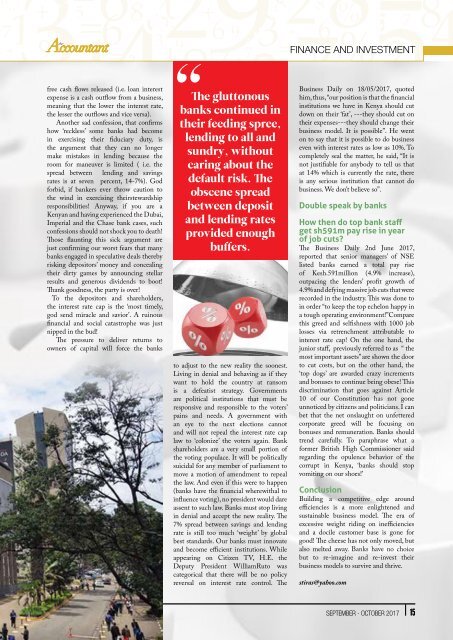The-Accountant-Sep-Oct-2017-Final
Create successful ePaper yourself
Turn your PDF publications into a flip-book with our unique Google optimized e-Paper software.
Finance and investment<br />
free cash flows released (i.e. loan interest<br />
expense is a cash outflow from a business,<br />
meaning that the lower the interest rate,<br />
the lesser the outflows and vice versa).<br />
Another sad confession, that confirms<br />
how ‘reckless’ some banks had become<br />
in exercising their fiduciary duty, is<br />
the argument that they can no longer<br />
make mistakes in lending because the<br />
room for maneuver is limited ( i.e. the<br />
spread between lending and savings<br />
rates is at seven percent, 14-7%). God<br />
forbid, if bankers ever throw caution to<br />
the wind in exercising theirstewardship<br />
responsibilities! Anyway, if you are a<br />
Kenyan and having experienced the Dubai,<br />
Imperial and the Chase bank cases, such<br />
confessions should not shock you to death!<br />
Those flaunting this sick argument are<br />
just confirming our worst fears that many<br />
banks engaged in speculative deals thereby<br />
risking depositors’ money and concealing<br />
their dirty games by announcing stellar<br />
results and generous dividends to boot!<br />
Thank goodness, the party is over!<br />
To the depositors and shareholders,<br />
the interest rate cap is the ‘most timely,<br />
god send miracle and savior’. A ruinous<br />
financial and social catastrophe was just<br />
nipped in the bud!<br />
<strong>The</strong> pressure to deliver returns to<br />
owners of capital will force the banks<br />
<strong>The</strong> gluttonous<br />
banks continued in<br />
their feeding spree,<br />
lending to all and<br />
sundry, without<br />
caring about the<br />
default risk. <strong>The</strong><br />
obscene spread<br />
between deposit<br />
and lending rates<br />
provided enough<br />
buffers.<br />
to adjust to the new reality the soonest.<br />
Living in denial and behaving as if they<br />
want to hold the country at ransom<br />
is a defeatist strategy. Governments<br />
are political institutions that must be<br />
responsive and responsible to the voters’<br />
pains and needs. A government with<br />
an eye to the next elections cannot<br />
and will not repeal the interest rate cap<br />
law to ‘colonize’ the voters again. Bank<br />
shareholders are a very small portion of<br />
the voting populace. It will be politically<br />
suicidal for any member of parliament to<br />
move a motion of amendment to repeal<br />
the law. And even if this were to happen<br />
(banks have the financial wherewithal to<br />
influence voting), no president would dare<br />
assent to such law. Banks must stop living<br />
in denial and accept the new reality. <strong>The</strong><br />
7% spread between savings and lending<br />
rate is still too much ‘weight’ by global<br />
best standards. Our banks must innovate<br />
and become efficient institutions. While<br />
appearing on Citizen TV, H.E. the<br />
Deputy President WilliamRuto was<br />
categorical that there will be no policy<br />
reversal on interest rate control. <strong>The</strong><br />
Business Daily on 18/05/<strong>2017</strong>, quoted<br />
him, thus, “our position is that the financial<br />
institutions we have in Kenya should cut<br />
down on their ‘fat’, ---they should cut on<br />
their expenses---they should change their<br />
business model. It is possible”. He went<br />
on to say that it is possible to do business<br />
even with interest rates as low as 10%. To<br />
completely seal the matter, he said, “It is<br />
not justifiable for anybody to tell us that<br />
at 14% which is currently the rate, there<br />
is any serious institution that cannot do<br />
business. We don’t believe so”.<br />
Double speak by banks<br />
How then do top bank staff<br />
get sh591m pay rise in year<br />
of job cuts?<br />
<strong>The</strong> Business Daily 2nd June <strong>2017</strong>,<br />
reported that senior managers’ of NSE<br />
listed banks earned a total pay rise<br />
of Kesh.591million (4.9% increase),<br />
outpacing the lenders’ profit growth of<br />
4.9% and defying massive job cuts that were<br />
recorded in the industry. This was done to<br />
in order “to keep the top echelon happy in<br />
a tough operating environment!”Compare<br />
this greed and selfishness with 1000 job<br />
losses via retrenchment attributable to<br />
interest rate cap! On the one hand, the<br />
junior staff, previously referred to as “ the<br />
most important assets” are shown the door<br />
to cut costs, but on the other hand, the<br />
‘top dogs’ are awarded crazy increments<br />
and bonuses to continue being obese! This<br />
discrimination that goes against Article<br />
10 of our Constitution has not gone<br />
unnoticed by citizens and politicians. I can<br />
bet that the net onslaught on unfettered<br />
corporate greed will be focusing on<br />
bonuses and remuneration. Banks should<br />
trend carefully. To paraphrase what a<br />
former British High Commissioner said<br />
regarding the opulence behavior of the<br />
corrupt in Kenya, ‘banks should stop<br />
vomiting on our shoes!’<br />
Conclusion<br />
Building a competitive edge around<br />
efficiencies is a more enlightened and<br />
sustainable business model. <strong>The</strong> era of<br />
excessive weight riding on inefficiencies<br />
and a docile customer base is gone for<br />
good! <strong>The</strong> cheese has not only moved, but<br />
also melted away. Banks have no choice<br />
but to re-imagine and re-invest their<br />
business models to survive and thrive.<br />
stiras@yahoo.com<br />
september - october <strong>2017</strong> 15

















